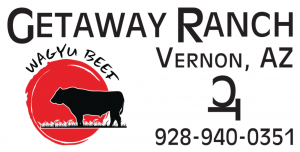What is American Wagyu?
According to the definition set forth by the U. S. Department of Agriculture, offspring of the Wagyu breed with more than 46.875% of traceable Wagyu genetics are eligible to claim Wagyu influence. To distinguish from the full blood Wagyu, we define our cows and calves as “American Wagyu.”
In addition to being renown for its tender, decadent, flavorful beef, Wagyu cattle also offer many other benefits, especially for a small operation such as our own. Most notable are their smaller size, docile nature and ease of calving, which make handling safer and manageable, and also reduce cow or calf loss (particularly for first-time mothers). Several studies also note the Wagyu’s longevity and physical fitness as superior compared to other major beef cattle breeds in the U. S.
“So why crossbreed,” you ask? Although Wagyu cattle offer many benefits, this breed is not without its drawbacks, which include slower growth and the tendency of cows to produce insufficient milk for their calves. On the other hand, the American mainstream breed, Angus, is known for its ample milking capacity, good feed efficiency and quality meat. Thus, by crossbreeding, we can take the best of both breeds and increase genetic diversity, which is known to improve the overall health and performance of cattle.
Over 90% of the American Wagyu cattle born and raised on our ranch have been graded at or beyond Prime, the highest beef grade in the United States. Given the fact that only 4-5% of all the commercial beef currently produced in the U.S. is classified as Prime, our efforts mark a phenomenal accomplishment and further validate the exceptionally superior genetic characteristics of the Wagyu-Angus crossbreed.
